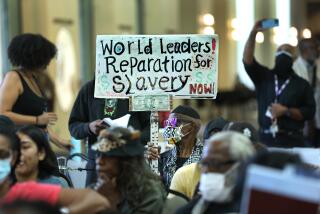Trying to Pay a Moral Debt
- Share via
A modest historic plaque marks the site of the Manzanar internship camp on U.S. 395 just north of Lone Pine in the Owens Valley. From the road, there is no other sign that this was the place where thousands of Japanese-Americans were imprisoned during World War II by a fearful nation to make certain that they did not commit some imagined treachery. Fly over Manzanar, however, and the evidence of the camp is striking. The outlines of the peripheral fences, streets and buildings still are firmly etched into the harsh desert terrain.
So, too, is the experience of Manzanar and other camps etched into the psyche of the loyal Americans who were relocated from the West Coast in 1942--their homes, farms and businesses taken from them. On the floor of the U.S. House of Representatives on Thursday, Rep. Robert T. Matsui (D-Sacramento) said that the shame of internship was so traumatic that “my father was not able to talk about this subject for 40 years.”
There is no way to make up for the lost years, the lost homes and the tears of shame and bitterness. The United States can, however, make a formal national apology and a gesture of compensation. This would be done in a $1.2-billion program approved by the House, granting the potential 66,000 surviving interness $20,000 each.
A flat monetary payment is controversial, even among the internees themselves. After 45 years, however, it is time for the nation to attempt to pay its long-overdue moral debt in some fashion. This bill deserves speedy Senate passage and the signature of President Reagan.
More to Read
Sign up for Essential California
The most important California stories and recommendations in your inbox every morning.
You may occasionally receive promotional content from the Los Angeles Times.










